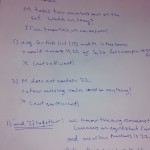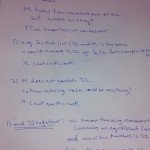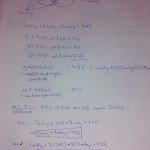A few simple ways to adjust your thinking might help.
At its core, the GMAT is a reasoning test.
That is, it tests they way that you think. It does this in a predictable, calculable way.
Unfortunately, many people who train for the GMAT are highly skilled in either a “harder” math/science skill or in a “softer” more language-oriented skill.
The difference between these two is not as significant as it seems. In fact, the reasoning that is required for the Quant section is not terribly different from the reasoning required to do well in the Verbal section.
First, the Verbal section uses extremely precise reasoning and can be broken down in a very similar way to how a math question can be broken down.
Otherwise, there would be no objective basis for the testwriters to determine what a “correct” or “incorrect” answer would be.

So if Verbal questions can be broken down in the same way as math questions, why can’t Quant questions be broken down in the same way as Verbal questions?
The problem with our relationship with math and our relationship with English is that English is something that we do all day every day.
It doesn’t seem fair that we would be expected to be as fluent in math as we are in English.
Fair enough—there’s no reason to expect that one would speak a second language as well as a first language.
What is the major difference?
Well, put simply, testtakers who are excellent in Verbal and struggling with Quant tend to do the Verbal section intuitively.
There are things that you, as a testtaker, are expected to notice about a Critical Reasoning question, for example.
Little inconsistencies—things that just “seem wrong.” Certain answer choices are out of scope, or don’t really deal with the argument.
If you can see these, then you understand intuitively which answers you can ignore. Sometimes you can even jump to the correct conclusion based on the question stem (that is, without looking at the answers).
Of course that could “never” happen with math.

Well, once your analysis of math and your ability to read the question comes to a level that is more or less equal to your ability with English, you will be able to see such things.
First, the answer choices are often totally silly. Once you understand the concept—the main point—of the question, it is often smooth sailing to get to an answer.
Just as in Verbal questions, Math questions ask about a particular idea—a concept. You have to figure out how to uncover—to dig out—what the concept is meant to be.
Once you realize that this is a question about Prime Factors, for example, then you realize that you need to factorize the number in question.
Or perhaps it’s a bit trickier than that, but it does involve Factors. Why not just prime factorize and see what happens?
A little bit of exploratory work never hurt anyone.
It’s a bit like saying “what if” in a Critical Reasoning question, or “Well, this sentence would be correct if I did…” in a Sentence Correction question.
So think about variations and permutations that you could make in the way that you approach your solutions in Quant.
Think about ways that you can represent Quant in a more Verbal way—my favorite is to write notes in the margins of a question–just look at all that writing!

In this case, you can actually see what you’re doing as you’re doing it. In fact, certain types of Quant questions—e.g., probability, permutations and combinations–are built almost entirely using verbal rather than mathematical techniques.
When you take notes in the margins, you’ll be able to see what you know and what you don’t know.
Where exactly in the process of solving this are you running into trouble? Once you know where the problem lies, it is much easier to address.
That is, if you see that you forgot to factor in a certain place, you can remember to do this the next time you complete the question.
Keep doing this—take copious notes for each question—and repeat the difficult questions over and over until you get them down completely.
Always be aware of what you’re doing as you study—note anywhere or anything that doesn’t make sense—and study that relentlessly.
Fake it ‘til you make it.
In jazz, arguably the most nerdy and complicated style of music, there is an old saying: “fake it ‘til you make it.”
What these players mean is that although they have all studied huge amounts of theory and technique—they have to in order to be able to keep up!—sometimes they DON’T INTELLECTUALLY UNDERSTAND WHAT THEY’RE DOING.
That doesn’t mean it doesn’t work. And strangely enough, once they relax into that melding of theory and practice—they fake it—eventually they do begin to understand!
UNDERSTAND AFTER DOING. GO FOR THE “HOW,” NOT THE “WHY.”
Sometimes you just have to run with a complicated concept as long as you’re given tools to solve the problem.
Who cares why it works as long as it does?
You’ll never be able to understand all of the concepts in Quant in exactly the way that the testwriter does—that would be like writing someone else’s novel, or speaking in someone else’s voice.
Understanding of math is unique to the individual just as they way that he or she speaks English is.
All YOU have to do is be able to unpack very precise—and precisely complicated–language and move toward a solution that’s in the ballpark.
Sometimes that’s all it takes. Just start doing it, and whether or not it all makes perfect sense, you’ll still be able to arrive at the answer.
Then the fun part begins—doing it in two minutes!
Click HERE to arrange a
FREE PHONE CONSULTATION
p.s. Can you use Quant techniques to solve Verbal questions?
p.p.s. How has this changed the way that you think about math vs. verbal?